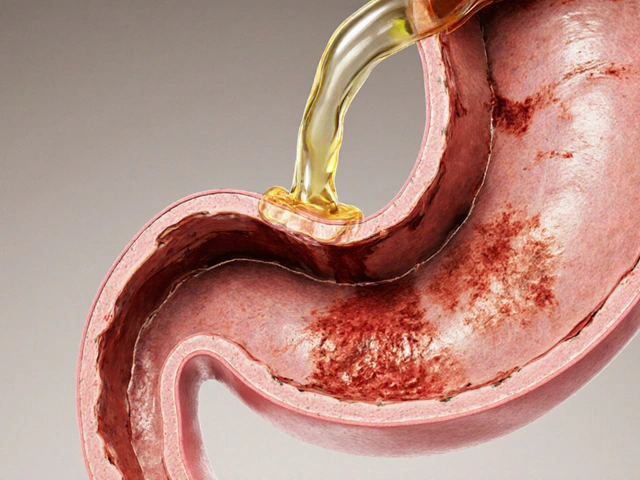Antipsychotic Alternative Finder
This tool helps you compare Abilify alternatives based on your primary concerns. Select what's most important to you, and we'll recommend the best options.
When doctors prescribe Abilify (aripiprazole), it’s often because other treatments haven’t worked-or caused too many side effects. But Abilify isn’t the only option. Many people end up switching because of weight gain, restlessness, or just not feeling like themselves. If you’re on Abilify and wondering if there’s something better, you’re not alone. This isn’t about ditching your medication. It’s about understanding what else is out there-and how each option stacks up against Abilify in real life.
What Abilify Actually Does
Abilify, or aripiprazole, is an antipsychotic that works differently than most. While older drugs like haloperidol block dopamine too hard, Abilify acts as a partial agonist. That means it doesn’t shut dopamine down completely-it tunes it. For some, this leads to fewer movement side effects. For others, it doesn’t do enough.
It’s approved for schizophrenia, bipolar disorder (both manic and mixed episodes), and as an add-on for major depression when SSRIs alone fail. It’s also used off-label for autism-related irritability and OCD. About 40% of people on Abilify report some improvement in symptoms within 2-4 weeks. But for nearly 30%, side effects make it hard to keep taking.
Common Side Effects of Abilify
Abilify’s side effect profile is mixed. Some people gain weight-around 2-5 kg on average-but not as much as with olanzapine or clozapine. Others feel jittery, restless, or have trouble sitting still. This is called akathisia, and it’s one of the top reasons people stop taking it.
Less common but serious risks include tardive dyskinesia (involuntary movements), elevated blood sugar, and in rare cases, neuroleptic malignant syndrome. The risk of these is lower than with older antipsychotics, but they still happen. People over 65 with dementia-related psychosis shouldn’t take Abilify at all-FDA warnings say it increases death risk.
Alternative 1: Risperidone (Risperdal)
Risperidone has been around longer than Abilify and is often cheaper. It’s effective for psychosis, aggression, and mania. Studies show it works just as well as Abilify for schizophrenia and bipolar disorder.
But here’s the catch: risperidone causes more weight gain and higher prolactin levels. That can lead to breast enlargement, missed periods, or low libido. It also carries a higher risk of movement disorders like dystonia. If you’re already struggling with weight or hormonal side effects, risperidone might make things worse.
It’s still a solid choice for people who need strong symptom control and can manage the side effects. Many patients switch to risperidone after Abilify fails-and end up happier because it controls hallucinations better.
Alternative 2: Quetiapine (Seroquel)
Quetiapine is a go-to for bipolar depression and insomnia. Unlike Abilify, it’s sedating. That’s a plus if you can’t sleep, but a problem if you’re already dragging all day. About 60% of users report feeling drowsy, especially early on.
It’s more likely than Abilify to cause weight gain-up to 7 kg in 12 weeks for some. Blood sugar and cholesterol levels can rise too. But for people with severe anxiety or sleep issues tied to bipolar disorder, quetiapine’s calming effect can be life-changing.
It’s not ideal for long-term use in younger adults because of metabolic risks. But for older patients or those with treatment-resistant depression, it often gets the job done when Abilify doesn’t.

Alternative 3: Lurasidone (Latuda)
Lurasidone is one of the newer options, approved for bipolar depression and schizophrenia. What makes it stand out? It doesn’t cause much weight gain. In clinical trials, users gained less than 1 kg on average-far less than Abilify or quetiapine.
It’s also less likely to raise blood sugar or cholesterol. Side effects are usually mild: nausea, restlessness, or dizziness. But it must be taken with food (at least 350 calories) to be absorbed properly. That’s a hassle for people who skip meals or have irregular schedules.
It’s not as strong for acute mania as Abilify, but for depressive episodes in bipolar disorder, it’s often the better choice. If your main issue is low mood, not agitation, lurasidone might be the cleanest swap.
Alternative 4: Olanzapine (Zyprexa)
Olanzapine is powerful. It’s often the first-line choice for severe psychosis because it works fast and well. But it’s also the most likely to cause weight gain-up to 10 kg in six months for some. Diabetes risk is real: up to 15% of long-term users develop prediabetes or type 2 diabetes.
It’s not a first-choice alternative to Abilify unless you’ve tried everything else. But for patients with treatment-resistant schizophrenia who’ve failed multiple meds, olanzapine can be the only thing that brings stability.
Doctors sometimes combine it with metformin to counteract metabolic side effects. It’s not pretty, but it works. If you’re willing to monitor your weight and blood sugar closely, it’s still a valid option.
Alternative 5: Cariprazine (Vraylar)
Cariprazine is the newest of the bunch. Like Abilify, it’s a partial dopamine agonist-but it targets D3 receptors more specifically. This might help with negative symptoms of schizophrenia: flat affect, social withdrawal, lack of motivation.
Studies show it’s slightly more effective than Abilify for these symptoms. Weight gain is minimal, similar to lurasidone. But it can cause more akathisia than Abilify. Restlessness is the biggest reason people stop taking it.
It’s expensive and not always covered by insurance. But if you’ve tried Abilify and still feel emotionally numb or disconnected, cariprazine might be worth a trial.
Alternative 6: Non-Drug Options and Combinations
Medication isn’t the whole story. Many people find that combining meds with therapy-like CBT or family-focused therapy-makes a big difference. Exercise, sleep hygiene, and reducing alcohol or caffeine can stabilize mood better than any pill alone.
For depression with bipolar features, omega-3 fatty acids (EPA/DHA) have shown modest benefit in trials. Magnesium and vitamin D supplementation are sometimes used, though evidence is weaker. These aren’t replacements, but they can help reduce the dose of medication needed.
Some people switch from Abilify to a lower-dose combination: an SSRI plus a tiny amount of aripiprazole. That’s actually how Abilify was originally approved for depression. But if you’re already on it and not improving, adding more isn’t the answer. Switching is.

How to Decide What’s Right for You
There’s no single best alternative. The right choice depends on your symptoms, your body, and your life.
- If you’re gaining weight: skip olanzapine, quetiapine. Try lurasidone or cariprazine.
- If you’re restless or jittery: avoid risperidone, cariprazine. Try quetiapine or lurasidone.
- If you can’t sleep: quetiapine helps. Abilify doesn’t.
- If you’re stuck in depressive episodes: lurasidone or cariprazine may work better than Abilify.
- If you need fast control of aggression or psychosis: risperidone or olanzapine.
Also consider cost. Abilify’s generic is cheap, but so is risperidone. Lurasidone and cariprazine are still expensive in many places. Ask your pharmacist about patient assistance programs.
When to Talk to Your Doctor
Don’t stop Abilify on your own. Withdrawal can cause rebound psychosis, anxiety, or insomnia. Tapering takes weeks.
Bring this list to your next appointment. Say: ‘I’ve been on Abilify for X months. I’m seeing some improvement, but I’m struggling with [side effect]. I’d like to explore alternatives. What do you think about lurasidone or cariprazine?’
Keep a symptom journal. Note sleep, mood, energy, and side effects for two weeks before and after any switch. That data helps your doctor make smarter choices.
What Most People Wish They Knew Earlier
Many people switch meds too quickly. It takes 6-8 weeks for a new antipsychotic to fully kick in. Don’t give up after two weeks.
Others think side effects are normal and just live with them. They’re not. Akathisia isn’t ‘just being anxious.’ Weight gain isn’t ‘just laziness.’ These are drug effects-and they’re treatable.
The best outcomes come from patience, communication, and tracking. You’re not failing if Abilify doesn’t work. You’re just finding the right fit.
Is Abilify better than other antipsychotics for depression?
Abilify is approved as an add-on for depression, but it’s not usually the best first choice. Lurasidone and cariprazine are more effective for bipolar depression with fewer metabolic side effects. For unipolar depression, adding Abilify helps about 30-40% of people who didn’t respond to SSRIs alone. But if you’re already on Abilify and still depressed, switching to lurasidone may give you better results.
Can I switch from Abilify to a natural supplement instead?
No. There are no proven natural supplements that replace antipsychotics for conditions like schizophrenia or bipolar disorder. Omega-3s, magnesium, or vitamin D may help support mood, but they won’t control psychosis or severe mania. Stopping prescribed medication without medical supervision can lead to relapse, hospitalization, or dangerous symptoms. Always talk to your doctor before making changes.
Which alternative has the least weight gain?
Lurasidone and cariprazine cause the least weight gain among antipsychotics-on average less than 1 kg over six months. Abilify causes mild weight gain (2-5 kg), while quetiapine and olanzapine can cause 7-10 kg. Risperidone falls in the middle. If weight is a major concern, lurasidone is often the safest switch.
Why does Abilify make me feel restless?
Abilify’s partial dopamine activity can overstimulate certain brain pathways, leading to akathisia-a feeling of inner restlessness or an urge to move. It’s not anxiety. It’s a neurological side effect. If you feel this, tell your doctor. Lowering the dose, switching to quetiapine, or adding a beta-blocker like propranolol can help. Don’t ignore it-it can get worse.
How long does it take for a new antipsychotic to work?
Most antipsychotics take 4-6 weeks to show full effects, and up to 8 weeks for mood stabilization. Some symptoms like agitation or sleep improve in the first week, but core symptoms like flat affect or delusions take longer. Don’t judge a new medication after two weeks. Give it time, track your progress, and keep your doctor updated.
Are generic versions of these drugs just as good?
Yes. Generic aripiprazole, risperidone, quetiapine, and olanzapine are bioequivalent to brand names and just as effective. Lurasidone and cariprazine are newer and mostly still brand-only, so they’re more expensive. But for older drugs, generics are safe, reliable, and save hundreds per month. Always check with your pharmacist to confirm the generic you’re getting is approved.
Next Steps
If you’re considering a switch, start by listing your top three concerns: weight gain? Restlessness? Low mood? Then match them to the alternatives above. Talk to your doctor with that list in hand. Bring your symptom journal. Ask about cost and insurance coverage. Don’t rush-but don’t stay stuck either. Finding the right medication isn’t a failure. It’s part of managing your health.






Cole Brown
November 1, 2025 AT 01:19Just wanted to say - if you're struggling with Abilify, you're not alone. I switched to lurasidone after 8 months of akathisia and gained back my energy. No weight gain, no brain fog. Took 6 weeks to feel normal, but it was worth it.
LeAnn Raschke
November 1, 2025 AT 11:20Thank you for writing this. So many people feel pressured to just ‘stick with it’ when meds aren’t working. You’re right - it’s not failure, it’s fine-tuning. I wish my first doctor had said that.
Alicia Buchter
November 1, 2025 AT 18:11Cariprazine is a nightmare. I had the worst restlessness of my life - couldn’t sit through a movie. My doctor called it ‘psychic akathisia’ like it was poetic. It felt like my bones were vibrating.
Kyle Buck
November 3, 2025 AT 04:32From a pharmacokinetic standpoint, the D3 receptor affinity of cariprazine confers a distinct neurochemical profile compared to aripiprazole’s D2/D3 partial agonism. The differential modulation of mesolimbic versus mesocortical pathways may explain its superior efficacy in negative symptoms, though the clinical translation remains heterogeneous due to interindividual CYP2D6 polymorphism variability.
Additionally, the metabolic liability of olanzapine is mediated through H1 histaminergic and 5-HT2C receptor antagonism - not merely caloric intake. This is why metformin co-administration demonstrates statistically significant attenuation of weight gain in RCTs (p < 0.01).
That said, real-world adherence is confounded by socioeconomic factors, insurance formularies, and patient health literacy - variables rarely accounted for in clinical trials.
Suresh Patil
November 3, 2025 AT 23:23In India, we don’t even have access to lurasidone or cariprazine. Risperidone is all we get - cheap, but the prolactin issues are brutal. My sister stopped menstruating for 11 months. No one talked about it. Just told her to ‘be patient’.
Maybe we need global conversations about access, not just side effect charts.
Ram Babu S
November 5, 2025 AT 04:20I was on Abilify for 2 years. Felt like a zombie. Switched to quetiapine - slept 10 hours a day, gained 15 lbs, but finally stopped hearing voices. Sometimes you trade one hell for another. But at least I’m alive to complain about it.
Halona Patrick Shaw
November 6, 2025 AT 15:06Y’all talking about meds like they’re coffee flavors. ‘Oh I switched to lurasidone, it’s like oat milk latte vs. espresso.’
Bro. This ain’t Starbucks. This is your brain. Your soul. Your ability to hug your kid without crying because you don’t feel anything.
I’ve been on 7 different antipsychotics. None fixed me. But I’m still here. That’s the win.
Danny Pohflepp
November 8, 2025 AT 04:36Let’s be honest - the pharmaceutical industry funds 90% of these ‘comparison studies.’ Lurasidone’s ‘minimal weight gain’? Look at the trial duration - 12 weeks. Real life is 12 years.
And why is cariprazine so expensive? Because they patented the D3 binding profile. Same molecule, different patent. That’s capitalism, not science.
Meanwhile, your doctor gets free lunches from reps who call it ‘the next big thing.’ Meanwhile, you’re paying $1,200/month and wondering why you’re still numb.
Don’t trust the algorithm. Trust your body. And document everything. They’ll use your data to sell the next drug.
Sarah Major
November 9, 2025 AT 13:26Everyone keeps saying ‘talk to your doctor’ like that’s magic. My psychiatrist didn’t even know what akathisia was. Said I was ‘just anxious.’ I cried in the parking lot after that appointment.
Adorable William
November 11, 2025 AT 06:19Omega-3s for bipolar? Please. That’s the same nonsense they pushed for ADHD. ‘Just take fish oil and stop blaming the system.’ I’ve taken 6 grams a day for 3 years. My psychosis didn’t care. My bank account did.
Elizabeth Nikole
November 12, 2025 AT 21:45I stopped Abilify cold turkey because I was tired of feeling like a ghost. 3 days later I was in the ER. They said I was ‘psychotic again.’ I said I was just trying to live. They didn’t listen.